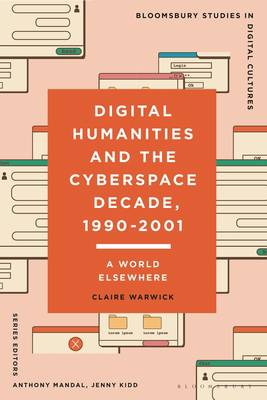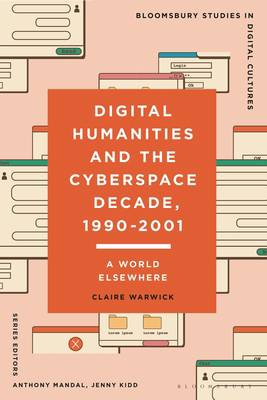
Bedankt voor het vertrouwen het afgelopen jaar! Om jou te bedanken bieden we GRATIS verzending (in België) aan op alles gedurende de hele maand januari.
- Afhalen na 1 uur in een winkel met voorraad
- In januari gratis thuislevering in België
- Ruim aanbod met 7 miljoen producten
Bedankt voor het vertrouwen het afgelopen jaar! Om jou te bedanken bieden we GRATIS verzending (in België) aan op alles gedurende de hele maand januari.
- Afhalen na 1 uur in een winkel met voorraad
- In januari gratis thuislevering in België
- Ruim aanbod met 7 miljoen producten
Zoeken
€ 195,45
+ 390 punten
Omschrijving
Setting out a history of cyberspace and its relationship with the discipline that was to become digital humanities, this book is an account of an often-forgotten period of internet history in the 1990s when this medium was in its infancy.
It provides a detailed account of the concepts of 'cyberspace' and the 'virtual', which were characteristic of a perception that using the internet allowed users to enter a separate space from everyday life- a world elsewhere. In doing so, it argues that this libertarian idea of the internet framed it as a new frontier, where the rules of the everyday world did not and should not apply, and where the individual could find freedom. These early norms and the regrettable lack of regulation that was a consequence of them, this book argues, contributed to many of current issues with internet media. including of toxic communication, disinformation and over-commercialisation
It provides a detailed account of the concepts of 'cyberspace' and the 'virtual', which were characteristic of a perception that using the internet allowed users to enter a separate space from everyday life- a world elsewhere. In doing so, it argues that this libertarian idea of the internet framed it as a new frontier, where the rules of the everyday world did not and should not apply, and where the individual could find freedom. These early norms and the regrettable lack of regulation that was a consequence of them, this book argues, contributed to many of current issues with internet media. including of toxic communication, disinformation and over-commercialisation
Specificaties
Betrokkenen
- Auteur(s):
- Uitgeverij:
Inhoud
- Aantal bladzijden:
- 256
- Taal:
- Engels
- Reeks:
Eigenschappen
- Productcode (EAN):
- 9781350452794
- Verschijningsdatum:
- 31/10/2024
- Uitvoering:
- Hardcover
- Formaat:
- Genaaid
- Afmetingen:
- 156 mm x 234 mm
- Gewicht:
- 530 g

Alleen bij Standaard Boekhandel
+ 390 punten op je klantenkaart van Standaard Boekhandel
Beoordelingen
We publiceren alleen reviews die voldoen aan de voorwaarden voor reviews. Bekijk onze voorwaarden voor reviews.









